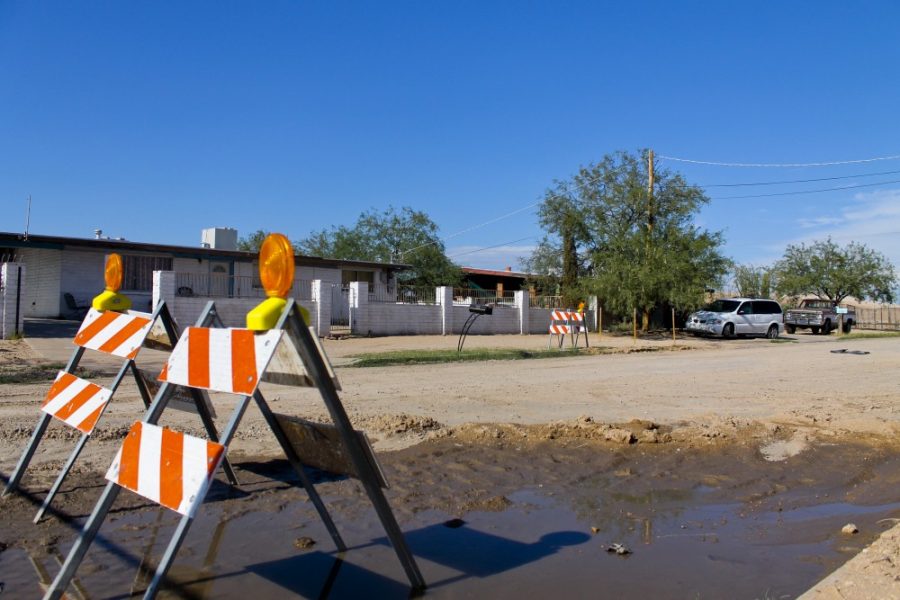With multiple student housing projects breaking ground throughout Tucson, developers and residents within the communities are facing various conflicts.
On February 28, Tucson’s mayor and council approved the Main Gate Overlay District, an overlay zoning area known as Area One that makes it more flexible for transit-oriented businesses to build within Euclid Avenue, Speedway Boulevard, Tyndall Avenue and First Street, despite opposition from 12,000 people in the surrounding historic neighborhood. The plans largely include new student housing developments in those areas.
The West University Neighborhood Association collected signatures of people who opposed the overlay district, displeased with the speed of the rezoning process. According to Chris Gans, the neighborhood association’s president, the mayor and council should have been more inclusive of the neighborhood when determining the rezone.
The council was interested in having transit-oriented developments, which serve bicyclists and pedestrians as well as those who ride buses or the streetcar. They approved the rezoning three months after it was introduced to the community, a process that usually takes six to nine months.
Campus Acquisitions, which is building a 14-story student-housing tower on Tyndall Avenue near the Speedway Boulevard intersection, went to the council saying it could build a transit-oriented project but that it needed to open before the fall 2013 semester.
“So in order for them to start construction to reach the goal of being an open building in 2013 for the fall semester, the council was willing to expedite the rezoning process,” said Jim Mazzocco, planning administrator with the City of Tucson Planning and Development Services department. “We didn’t skip any steps.”
Gans doesn’t like the changes made in the area, which is considered a transition zone between the historic neighborhood west of the university and the university campus itself. The height restrictions on buildings in that area, which were once around 30 feet, are now 159 feet, allowing Campus Acquisitions to build both the 14-story and a future 13-story housing project.
“We also had our own plan, which was a lot higher than what our old neighborhood plan called for but we couldn’t even get them (the council) to talk about that,” Gans said. The biggest disagreement Gans and others in the historic neighborhood had with the city was regarding the speedy process, which Gans believes didn’t account for the long-term effects on the neighborhood, businesses and developers.
“We understand the necessity for new development and we’re not opposed to well-planned and appropriate development that actually serves the residential neighborhood as well,” Gans said. “This has really been aimed at getting something passed so that a student housing project get built.”
The neighborhood association’s 12,000 signature petition was dismissed on a technicality and Campus Acquisitions is currently building the tower. The council will decide on August 7 whether a section west of Euclid Avenue near Speedway Boulevard will be considered a special exceptions area as well, allowing it the flexibility that Area One was granted.
“You could get flexibility in the parking standards and flexibility in the loading standards,” Mazzocco said. “As long as you’re putting a development that is transit-oriented.”
Landmark Properties, a developer working on student housing on 22nd Street and Park Avenue, faced a different situation when preparing for demolition and construction.
A family with two properties on 23rd Street refused to sell their homes to the developer, forcing a change in their site plan. George Kalil, owner of Kalil Bottling Company and president of the Millville Neighborhood Association, said he talked to the family regarding the permanence of their decision.
“Somewhere along the lines it’ll be too late once they lay the cement and they put the roads in,” Kalil said.
The developer offered $250,000 for each of the two properties, but the families still refused. Kalil said at the time that the developer was purchasing the properties in January, one of their elderly relatives wanted to stay there.
“Every time we approached them, they would basically just double our offer and we just kind of took it that they did not want to sell at any price at that point,” said Jason Doornbos, vice president of acquisitions and development of Landmark Properties.
The developer plans to build around the two houses and put up a wall to separate them from the student housing community.
“We won’t even be able to tell that they’re there,” Doornbos said.
Though Kalil believes the housing complex will change the neighborhood completely, he said the family seems to be “perfectly happy” being in the middle of the complex.
“They said, ‘No, we’re quite content staying right here,’” he added.
Landmark Properties’ complex, which will be named The Retreat, is set to open fall 2013 with 774 bedrooms.









